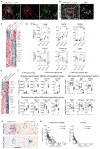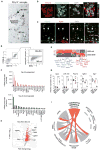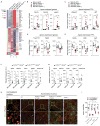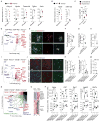The TREM2-APOE Pathway Drives the Transcriptional Phenotype of Dysfunctional Microglia in Neurodegenerative Diseases
- PMID: 28930663
- PMCID: PMC5719893
- DOI: 10.1016/j.immuni.2017.08.008
The TREM2-APOE Pathway Drives the Transcriptional Phenotype of Dysfunctional Microglia in Neurodegenerative Diseases
Abstract
Microglia play a pivotal role in the maintenance of brain homeostasis but lose homeostatic function during neurodegenerative disorders. We identified a specific apolipoprotein E (APOE)-dependent molecular signature in microglia from models of amyotrophic lateral sclerosis (ALS), multiple sclerosis (MS), and Alzheimer's disease (AD) and in microglia surrounding neuritic β-amyloid (Aβ)-plaques in the brains of people with AD. The APOE pathway mediated a switch from a homeostatic to a neurodegenerative microglia phenotype after phagocytosis of apoptotic neurons. TREM2 (triggering receptor expressed on myeloid cells 2) induced APOE signaling, and targeting the TREM2-APOE pathway restored the homeostatic signature of microglia in ALS and AD mouse models and prevented neuronal loss in an acute model of neurodegeneration. APOE-mediated neurodegenerative microglia had lost their tolerogenic function. Our work identifies the TREM2-APOE pathway as a major regulator of microglial functional phenotype in neurodegenerative diseases and serves as a novel target that could aid in the restoration of homeostatic microglia.
Keywords: APOE; Alzheimer’s disease; TREM2; amyotrophic lateral sclerosis; microglia; multiple sclerosis; neurodegeneration; transcriptional regulation.
Copyright © 2017 Elsevier Inc. All rights reserved.
Conflict of interest statement
Figures







Comment in
-
A Tale of Two Genes: Microglial Apoe and Trem2.Immunity. 2017 Sep 19;47(3):398-400. doi: 10.1016/j.immuni.2017.08.015. Immunity. 2017. PMID: 28930654
References
-
- Boillee S, Yamanaka K, Lobsiger CS, Copeland NG, Jenkins NA, Kassiotis G, Kollias G, Cleveland DW. Onset and progression in inherited ALS determined by motor neurons and microglia. Science. 2006;312:1389–1392. - PubMed
Publication types
MeSH terms
Substances
Grants and funding
LinkOut - more resources
Full Text Sources
Other Literature Sources
Medical
Molecular Biology Databases
Miscellaneous

